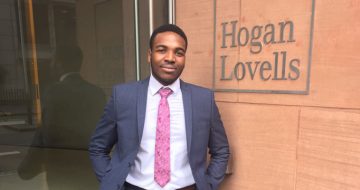Ahead of Legal Cheek’s ‘How to make it as a City lawyer’ event in London on 4 July, panellist Rebecca Wales, a litigator at Hogan Lovells, explains how curiosity, open-mindedness and the ability to work as part of a team are also key differentiating traits

Hogan Lovells dispute resolution partner Rebecca Wales is currently representing Ukraine’s biggest bank in the High Court, where she recently secured her client, Privatbank, a freezing order against two Ukrainian oligarchs worth — wait for it — an insanely large $2.6 billion (£2 billion). These numbers are par for the course for a top commercial litigator working on the most complex cases currently on offer in the UK, which, as we saw with the Privatbank case, make splashes in the international press.
To reach such heady heights takes commitment, says Wales, who will be speaking at Legal Cheek’s ‘How to make it as a City lawyer’ event at BPP Law School in London on 4 July. She elaborates: “There is a lot of negativity around how hard lawyers have to work but the fact is it takes commitment to do well at anything, not just at a City law firm.” There is every reason to be so committed: a firm like Hogan Lovells offers some of the most interesting and high quality work out there.
Alongside hard work, Wales prizes curiosity. In media interviews, she has compared her job to that of an investigative journalist, because lawyers are required to, investigate, analyse, then pull evidence together to build a strong case; and, last but not least, present the story cogently to the court. “You’ll need an inquisitive mind, to be interested and interesting, and hopefully have some fresh ideas,” adds Wales.
She also stresses the need for collaborative working. Large law firms like Hogan Lovells have sizeable teams of lawyers handling huge cases and deals, so individualism needs to be tempered. Wales says that her firm “actively works to find people who can work collaboratively”. She explains: “In our practice, we usually work in teams. We truly believe we are better by bringing very talented individuals together as teams.” One of the enjoyable things about working this way is the “people with different life experiences and from different backgrounds who have a different perspective” that this means operating alongside. Of her team Wales says: “They will sometimes come up with an idea that I would never have — could never have — dreamed of.”
Wales did not set out to be a litigator. The UCL history of art graduate decided after university that she wanted to be a lawyer. Having turned down the offer of a junior consultant job with PwC she did the Graduate Diploma in Law (GDL), before securing a training contract with Hogan Lovells. It was only when she did a litigation seat during her training contract that it all fell into place. Accordingly she is sympathetic to trainees who start their careers not knowing what kind of a lawyer they want to be. Indeed, she thinks that it may give them an advantage. “It’s probably better to keep an open mind on what practice area you might suit because you won’t really know until you’ve tried. Experience is essential to making those kinds of decisions,” she says.
For example, even within litigation there will be different types of work. Wales explains:
“It depends where your interests lie and you won’t know that until you try. Some people would say that what I do involves significant levels of pressure, high-profile clients, supersized cases, all adding up to whole load of stress they don’t want. I look at these elements and I think: what fun!”
Litigation, more than many other practice areas, engages with a fair amount of tech and artificial intelligence, from sophisticated systems for disclosure to machine translations. But tech is not of itself a skill which is needed to be a good lawyer, says Wales. Instead, experience of tech is “something we would, as an additional skill or interest, just take into account”.
She adds: “From a litigation perspective, we have been using AI for years — we just haven’t called it that. Going forward, I do not see tech advancement as something to be scared of, but an opportunity to help lawyers get through some of the less interesting work much more efficiently than used to be the case, which is an advantage for clients too.”
Having made partner in early 2016, Wales says that partnership is not something which she specifically set her sights on, more the ambition to keep stretching herself and to work on interesting cases. It can be difficult as a young lawyer to see that far ahead, she acknowledges, reflecting: “It’s more usual to think about, plan for — and work towards — the next four or five years. Beyond that there are too many unknown unknowns (as the saying goes).”
Rebecca Wales will be speaking at Legal Cheek’s ‘How to make it as a City lawyer’ event at BPP University Law School in London on 4 July, alongside lawyers from Baker McKenzie and Mayer Brown. Apply to attend.

